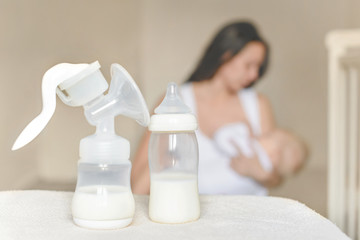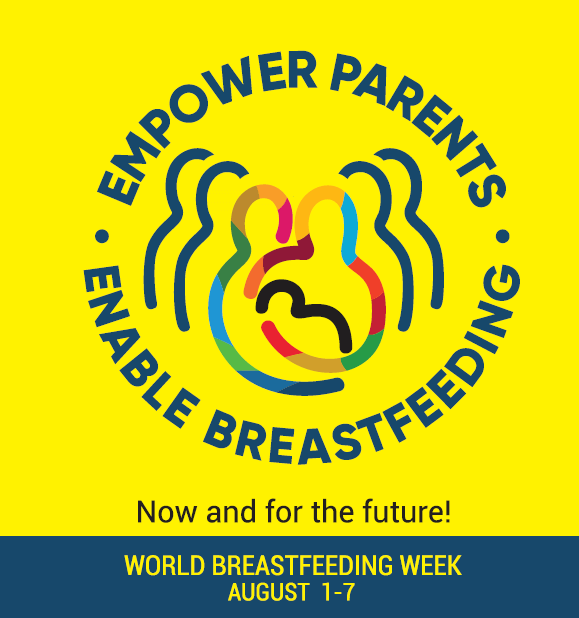Breastfeeding
Lactation Services
Benefits of Breastfeeding
Baby:
-
Early skin-to-skin contact and suckling may have physical and emotional benefits.
- Reduce the risk for certain allergic diseases, asthma, obesity, and type 2 diabetes.
- Improve infant's cognitive development.
- Decreases chances of Sudden Infant Death Syndrome, ear infections, vomiting, diarrhea, pneumonia, urinary tract infections, or certain types of spinal meningitis.
- Lower respiratory tract infections, such as croup, bronchiolitis, or pneumonia.
- Less likely to develop childhood acute leukemia and lymphoma than those who receive formula.
- Less likely to be obese in adolescence and adulthood.
- Less vulnerable to developing both type 1 and type 2 diabetes.
Mother:
Reasons to initiate breastfeeding:
- Reduce maternal bleeding after delivery
- Involute uterus
- Facilitate positive metabolic changes
- Facilitate postpartum weight loss
- Reduce stress
- Delay ovulation
Reasons to continue breastfeeding:
- Increase postpartum weight loss
- Prolong lactational ammenorrhea
- Decrease visceral adiposity
- Reduce type 2 diabetes risk
- Reduce cardiovascular risk
- Reduce breast cancer risk
- Reduce ovarian cancer risk
Research shows that breastfeeding offers many health benefits for infants and mothers, as well as potential economic and environmental benefits for communities.
Breastfeeding provides essential nutrition. Among its other known health benefits are some protection against common childhood infections and better survival during a baby's first year, including a lower risk of Sudden Infant Death Syndrome.
Research also shows that very early skin-to-skin contact and suckling may have physical and emotional benefits.
Other studies suggest that breastfeeding may reduce the risk for certain allergic diseases, asthma, obesity, and type 2 diabetes. It also may help improve an infant's cognitive development.
What are the recommendations for breastfeeding?
In the United States, the American Academy of Pediatrics (AAP) currently recommends:
- Infants should be fed breast milk exclusively for the first 6 months after birth. Exclusive breastfeeding means that the infant does not receive any additional foods (except vitamin D) or fluids unless medically recommended.
- After the first 6 months and until the infant is 1 year old, the AAP recommends that the mother continue breastfeeding while gradually introducing solid foods into the infant's diet.
- After 1 year, breastfeeding can be continued if mutually desired by the mother and her infant.
The World Health Organization currently promotes as a global public health recommendation that:
- Infants be exclusively breastfed for the first 6 months after birth to achieve optimal growth, development, and health.
- After the first 6 months, to meet their evolving nutritional requirements, infants should receive nutritionally adequate and safe complementary foods while breastfeeding continues for up to 2 years of age or beyond.
Human milk provides virtually all the protein, sugar, and fat your baby needs to be healthy, and it also contains many substances that benefit your baby's immune system, including antibodies, immune factors, enzymes, and white blood cells. These substances protect your baby against a wide variety of diseases and infections not only while he is breastfeeding but in some cases long after he has weaned. Formula cannot offer this protection.
This defense against illnesses significantly decreases the chances that your breastfeeding baby will suffer from ear infections, vomiting, diarrhea, pneumonia, urinary tract infections, or certain types of spinal meningitis. Infants under the age of one who breastfed exclusively for at least four months, for instance, were less likely to be hospitalized for a lower respiratory tract infection, such as croup, bronchiolitis, or pneumonia, than were their formula-fed counterparts children who breastfeed for more than six months are less likely to develop childhood acute leukemia and lymphoma than those who receive formula.
Recent research even indicates that breastfed infants are less likely to be obese in adolescence and adulthood. They are also less vulnerable to developing both type 1 and type 2 diabetes.
Source: US National Library of Medicine National Institutes of Health
Lactation Services
For one-on-one assistance with breastfeeding, please call (559) 624-6012.Located at 400 W. Mineral King, Visalia, CA -- Mother Baby Unit, 3rd floor of the Acequia Wing
Assistance with:
- Latch difficulties
- Slow weight gain
- Baby not regained birth weight at 2 weeks
- Sore nipples
- Decrease in milk supply
- Severe engorgement
- Free Weight checks

